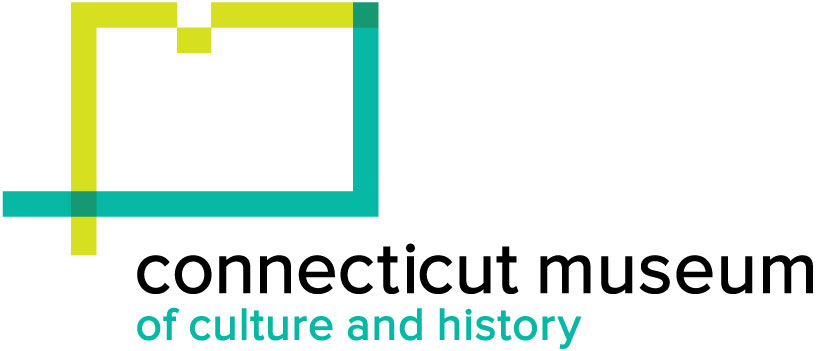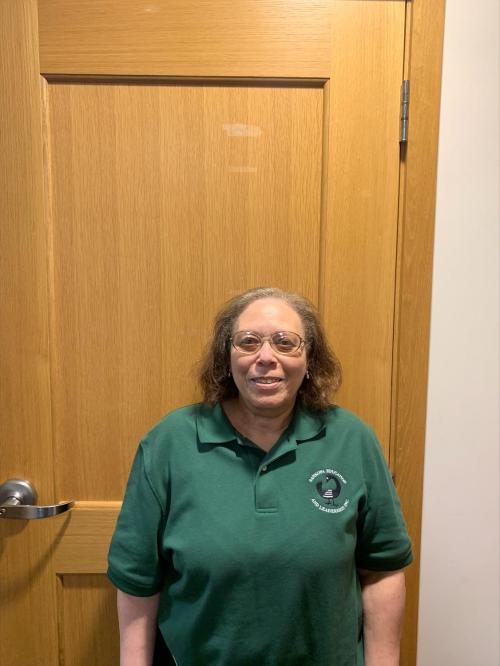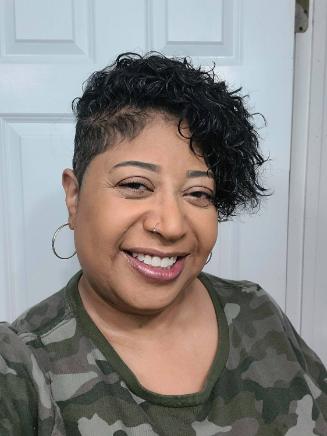Interview with Shiela Hayes
IntervieweeInterview with
Shiela Hayes
InterviewerInterviewed by
Samariya Smith
InterviewerInterviewed by
Abbie Cowan
Date2022 May 17
Mediumborn digital audio file
DimensionsDuration: 48 Minutes, 22 Seconds
ClassificationsInformation Artifacts
Credit LineCommunity History Project Collection
Object number2022.20.6a-b
Description(a) Interview with Shiela Hayes. Interviewed by Samariya Smith and Abbie Cowan on May 17, 2022 at Otis Library, 261 Main Street, Norwich. (b) Photograph of Shiela Hayes taken at her interview. She was interviewed as part of the Connecticut Historical Society's Community History Project discussing her experience during the COVID-19 Pandemic.
Sheila Hayes was born in St. Louis, Missouri. Her father was working on the Alaska pipeline and lived in Alaska while the rest of the family was in Missouri. In the late 1950s, her family moved to Norwich, Connecticut in order to give her and her siblings greater educational opportunities. Sheila described Norwich as ‘home.’
At the time of the interview, Sheila is currently retired but active in community work and is the president of the Norwich branch of the NAACP.
Sheila described the beginning of the pandemic as confusing and recalled receiving lots of conflicting information from different sources. While public officials advised against the use of masks, Sheila’s brother was sending her masks and gloves, and telling her to distance herself from others. She received information from different sources close to her, including her brother, her daughter (a scientist), and individuals on the local community health board and from friends working in healthcare.
Sheila was very concerned about remote learning and the welfare of children during the beginning of the pandemic. She felt frustrated by people ignoring recommendations regarding social distancing and described herself as supportive of mask and vaccine mandates in order to protect society and said that although she is supportive of freedom and personal choice, she does not support personal freedom when it comes at the cost of other people’s wellbeing.
Sheila described the 2020 election as frustrating due to Connecticut’s lack of early/absentee voting. Voters in Connecticut were unfamiliar with absentee voting and were wary of the process. Sheila was in Texas during the January 6th insurrection [2021] and was shocked while watching the situation unfold on television. She described the events as worse than 9/11 [September 11, 2001].
The pandemic interrupted many things in Sheila’s life. Her son’s wedding was postponed but rescheduled to June 2021. Although some guests were unable to attend due to the travel involved, her son and his wife still had their wedding. She was also unable to attend her daughter’s graduation from graduate school.
Sheila described herself as “Zoomed out” and exhausted, but despite this, her mental health remained stable throughout the pandemic. She attributes this to her involvement in the NAACP and working with children. Sheila believed the most devastating effect of the pandemic was the increase in suicides, particularly among young people. Sheila experienced this firsthand through the loss of her friend, who died by suicide.
The biggest thing Sheila lost during the pandemic was the freedom to be with family, and the biggest lesson she learned was not to take freedom and life for granted. Her advice to future generations is to be proactive rather than reactive, and to use the pandemic as a learning tool. She hopes that the pandemic made her more of a compassionate person and the public will become more civil. When asked to describe the pandemic in one word, Sheila chose “overwhelming.”
When asked if there was anything else she would like to add, she discussed the fear white Americans have of the “browning” of America, and how this fear has become a rallying point for white supremacists. Although she doesn’t have a problem with the 2nd amendment, she has a problem with how the judicial system deals with violent white people whose use guns to commit crimes.
Sheila Hayes was born in St. Louis, Missouri. Her father was working on the Alaska pipeline and lived in Alaska while the rest of the family was in Missouri. In the late 1950s, her family moved to Norwich, Connecticut in order to give her and her siblings greater educational opportunities. Sheila described Norwich as ‘home.’
At the time of the interview, Sheila is currently retired but active in community work and is the president of the Norwich branch of the NAACP.
Sheila described the beginning of the pandemic as confusing and recalled receiving lots of conflicting information from different sources. While public officials advised against the use of masks, Sheila’s brother was sending her masks and gloves, and telling her to distance herself from others. She received information from different sources close to her, including her brother, her daughter (a scientist), and individuals on the local community health board and from friends working in healthcare.
Sheila was very concerned about remote learning and the welfare of children during the beginning of the pandemic. She felt frustrated by people ignoring recommendations regarding social distancing and described herself as supportive of mask and vaccine mandates in order to protect society and said that although she is supportive of freedom and personal choice, she does not support personal freedom when it comes at the cost of other people’s wellbeing.
Sheila described the 2020 election as frustrating due to Connecticut’s lack of early/absentee voting. Voters in Connecticut were unfamiliar with absentee voting and were wary of the process. Sheila was in Texas during the January 6th insurrection [2021] and was shocked while watching the situation unfold on television. She described the events as worse than 9/11 [September 11, 2001].
The pandemic interrupted many things in Sheila’s life. Her son’s wedding was postponed but rescheduled to June 2021. Although some guests were unable to attend due to the travel involved, her son and his wife still had their wedding. She was also unable to attend her daughter’s graduation from graduate school.
Sheila described herself as “Zoomed out” and exhausted, but despite this, her mental health remained stable throughout the pandemic. She attributes this to her involvement in the NAACP and working with children. Sheila believed the most devastating effect of the pandemic was the increase in suicides, particularly among young people. Sheila experienced this firsthand through the loss of her friend, who died by suicide.
The biggest thing Sheila lost during the pandemic was the freedom to be with family, and the biggest lesson she learned was not to take freedom and life for granted. Her advice to future generations is to be proactive rather than reactive, and to use the pandemic as a learning tool. She hopes that the pandemic made her more of a compassionate person and the public will become more civil. When asked to describe the pandemic in one word, Sheila chose “overwhelming.”
When asked if there was anything else she would like to add, she discussed the fear white Americans have of the “browning” of America, and how this fear has become a rallying point for white supremacists. Although she doesn’t have a problem with the 2nd amendment, she has a problem with how the judicial system deals with violent white people whose use guns to commit crimes.
Label TextListen to interview at http://hdl.handle.net/11134/40002:19645792
NotesSubject Note: The Connecticut Historical Society’s Community History Project (CHP) is a public-facing initiative, focused on contemporary collecting, gathering items of the recent past as well as from events happening today. This program developed community historians to identify, document, and preserve their experiences as residents of Connecticut, and to share these experiences during a series of community presentations. The project focused on the impact of Covid-19 on Connecticans, particularly on Black and Brown communities, funeral homes, and on nursing home and elder care populations.Cataloging Note: This cataloging project was made possible in part by the Institute of Museum and Library Services MA-249472-OMS-21.
Status
Not on view2022 June 8
2022 June 2
2022 February 26
2022 November 16
2022 August 15
2022 December 6









